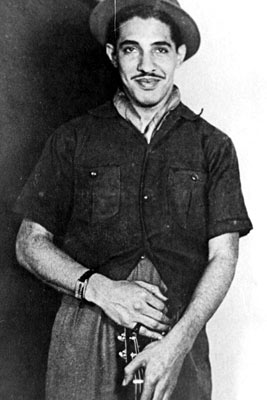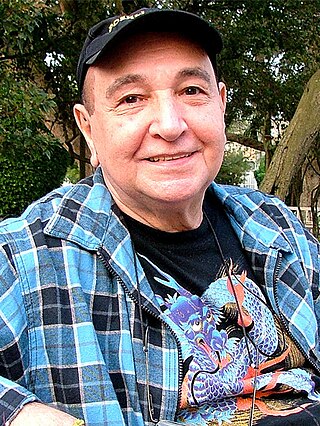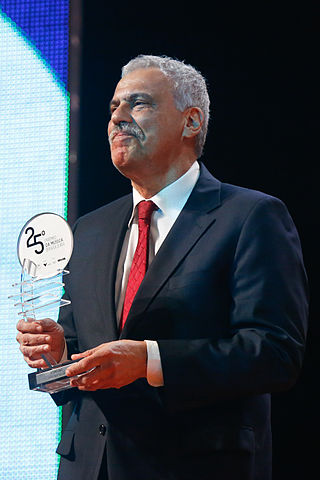
Eduardo de Góes "Edu" Lobo is a Brazilian singer, guitarist, and composer.

Joyce Moreno, commonly known as Joyce, is a Brazilian singer-songwriter and guitarist.

Dorival Caymmi was a Brazilian singer, songwriter, actor, and painter active for more than 70 years, beginning in 1933. He contributed to the birth of Brazil's bossa nova movement, and several of his samba pieces, such as "Samba da Minha Terra", "Doralice" and "Saudade da Bahia", have become staples of música popular brasileira (MPB). Equally notable are his ballads celebrating the fishermen and women of Bahia, including "Promessa de Pescador", "O Que É Que a Baiana Tem?", and "Milagre". Caymmi composed about 100 songs in his lifetime, and many of his works are now considered to be Brazilian classics. Both Brazilian and non-Brazilian musicians have covered his songs.

Gal Maria da Graça Costa Penna Burgos, known professionally as Gal Costa ( ), was a Brazilian singer of popular music. She was one of the main figures of the tropicalia music scene in Brazil in the late 1960s and appeared on the acclaimed compilation Tropicália: ou Panis et Circencis (1968). She was described by The New York Times as "one of Brazil's greatest singers."
Samba-canção is, in its most common acceptance or interpretation, the denomination for a kind of Brazilian popular songs with a slow-paced samba rhythm.

Quarteto em Cy is a Brazilian girl group originally composed of four sisters hailing from Ibirataia, a town located in the Brazilian state of Bahia: Cybele, Cylene, Cynara and Cyva – their real first names.

Getz/Gilberto #2 is a live album by Stan Getz and João Gilberto, released in 1966. It was recorded at a live concert at Carnegie Hall in October 1964. The previous album Getz/Gilberto won the 1965 Grammy Awards for Best Album of the Year and Best Jazz Instrumental Album - Individual or Group, among others. The painting on the cover is by Olga Albizu.
Celso Fonseca is a Brazilian composer, producer, guitarist and singer. He is noted as part of the Música popular brasileira since the 1980s, initially as accompanist and composer, then producer, and since the mid–1990s as an artist in his own right.

João Donato de Oliveira Neto was a Brazilian jazz and bossa nova pianist as well as a trombonist from Rio Branco. He first worked with Altamiro Carrilho and went on to perform with Antonio Carlos Jobim and Astrud Gilberto. Because of the area he grew up in Brasil he was able to hear Cuban music on the radio. This influence would manifest itself in many of his compositions, piano, and trombone playing. Donato's most well-known compositions include: "Amazonas", "Lugar Comum", "Simples Carinho", "Até Quem Sabe" and "Nasci Para Bailar".

Antônio Brasileiro is the fifteenth album by Antônio Carlos Jobim. It was released days after his death in 1994. The album was completed 11 months before his death, and was a critical and commercial success. The album was awarded the 1995 Grammy Award for Best Latin Jazz Album.
Olivia Hime is a Brazilian singer and lyricist. She is also the co-owner and musical manager of the record label Biscoito Fino. In 2005, the song Cancao Transparente, composed by Hime and her husband, pianist and composer Francis Hime, was nominated for a Latin Grammy Award for Best Brazilian Song.

Rosa Passos is a Brazilian singer and guitarist.

Dorival "Dori" Tostes Caymmi is a Brazilian singer, songwriter, guitarist, arranger, and producer.
"Inútil Paisagem" is a song composed by Antônio Carlos Jobim, with lyrics by Aloysio de Oliveira. An English-language version with lyrics by Ray Gilbert is titled "If You Never Come to Me".

Danilo Candido Tostes Caymmi is a Brazilian musician, singer, composer and arranger.

I Love Brazil! is a 1977 studio album by Sarah Vaughan, accompanied by prominent Brazilian musicians Milton Nascimento, Dori Caymmi, and Antônio Carlos Jobim.
The discography of Brazilian singer Maria Bethânia consists of 34 studio albums, 15 live albums, several participations in movie and telenovela soundtracks as well as numerous collaborations with other artists.
"A felicidade" ("Happiness") is a bossa nova song by Antônio Carlos Jobim, with lyrics by Vinícius de Moraes, composed in 1958 for the French film Orfeu Negro.

Alaíde Costa Silveira Mondin Gomide, known as Alaíde Costa, is a Brazilian singer-songwriter.
Caymmi visita Tom is a bossa nova album released in 1964. It is the result of a partnership between musicians Antônio Carlos Jobim and Dorival Caymmi.













